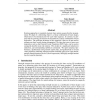Free Online Productivity Tools
i2Speak
i2Symbol
i2OCR
iTex2Img
iWeb2Print
iWeb2Shot
i2Type
iPdf2Split
iPdf2Merge
i2Bopomofo
i2Arabic
i2Style
i2Image
i2PDF
iLatex2Rtf
Sci2ools
141
click to vote
NIPS
2008
2008
Nonrigid Structure from Motion in Trajectory Space
Existing approaches to nonrigid structure from motion assume that the instantaneous 3D shape of a deforming object is a linear combination of basis shapes, which have to be estimated anew for each video sequence. In contrast, we propose that the evolving 3D structure be described by a linear combination of basis trajectories. The principal advantage of this approach is that we do not need to estimate any basis vectors during computation. We show that generic bases over trajectories, such as the Discrete Cosine Transform (DCT) basis, can be used to compactly describe most real motions. This results in a significant reduction in unknowns, and corresponding stability in estimation. We report empirical performance, quantitatively using motion capture data, and qualitatively on several video sequences exhibiting nonrigid motions including piece-wise rigid motion, partially nonrigid motion (such as a facial expression), and highly nonrigid motion (such as a person dancing).
Related Content
| Added | 30 Oct 2010 |
| Updated | 30 Oct 2010 |
| Type | Conference |
| Year | 2008 |
| Where | NIPS |
| Authors | Ijaz Akhter, Yaser Sheikh, Sohaib Khan, Takeo Kanade |
Comments (0)

